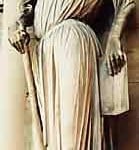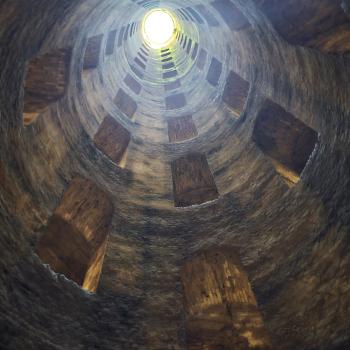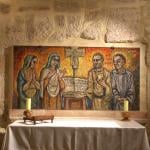Tom’s fondness for chiastic structures leads to the final three chapters of the book (minus the final final chapter which is just conclusions) being a revisiting of the issues introduced in the first three chapters of this magnum opus, only now in reverse order. SO the overall plan of the book is: 1) the study of Paul’s world in three parts; 2) the study of Paul’s theology focused on three major themes— monotheism, election, and eschatology; and then 3) the placing of Paul within his world in three chapters followed by a conclusion. Philosophy, religion and empire are seen as three major dimensions of that world, and Tom will deal with them in reverse order, and presumably with Paul in his Jewish context along the way. Part of the point of the chiastic structure is because “Paul saw Jesus himself as the mid-point of the world– of all creation, all space, time and matter”.” (p. 1269). Like a jelly-filled doughnut, its what’s in the middle that matters!
So first to Paul and Empire. Tom carefully lays out the three different broad approaches to this matter: 1) Paul was actually an enthusiast for the Empire (See Blumenfeld, Dodd, Ramsay), as a Roman citizen he saw and used its benefits, its road etc. only drawing the line at idolatry and immorality; 2) Paul was a radical critique of the Empire and its brutal domination systems (see e.g.Horsley, Crossan, Elliott etc.). A modified version of this view is where Tom has landed in the past– there being an implied critique of Empire in Paul’s theology, not a frontal assault on it. 3) Paul saw empires as all passing away, his real concern was with principalities and powers and so his focus was elsewhere (Bryan, Kim, Barclay in a more nuanced way). Tom will use Barclay as his major dialogue partner in this chapter. Tom cautions against viewing this issue in a kind of simplistic way, because of course pagan rulers and their rule could vary from faith friendly to monotheists to brutally oppressive, so on the one hand you can hear in the OT about how pagan rule over Israel was a judgment on Israel’s own sin, and so the proper response was to be good citizens under the ruler, and do what good one can to protect God’s people (see Esther, Dan. 1-6; bits of Jeremiah and compare Is. 45.1-13). But on the other hand, when a pagan empire becomes oppressive and Biblical faith becomes impossible (think e.g. under Hitler the strain of being a Jew or a genuine Christian), then we have predictions of the over-throw of the pagan ruler and empire due to it putting itself in the place of God and oppressing God’s people. See the prophecy of Babylon’s doom in Jerm. 50-51, or Dan. 7ff. It is important to note that along the way the normal default assumption is exactly what Jesus says— no one would have genuine governmental authority if it were not given them from above (or presumably at least allowed by God). See for example Wis. Sol. 6.1-5– “For your dominion was given you from the Lord, and your sovereignty from the most High”. To this one may compare Rom. 13.1-7 and also the parallels in 1 Peter. Thus when we get to pp. 1276-77, while Tom is right to say that the crucial question is What time is it? Is it the time during which God has given pagan empires permission to rule over God’s people, and they should ‘seek the welfare of the city’ or is it the eschatological time when the kingdoms of this world will become the kingdoms of our God and of his Christ? For surely, the time will come, as OT and NT both say, that God will fully establish his own Kingdom on earth, eclipsing all earthly realms. Did Paul envision he was already living in that latter day, or did he see himself as living in some sort of already and not yet situation, some sort of overlap period or twilight zone?
I fully agree with the point on p. 1277 that Paul’s focus was entirely on the community of Christ, the family of Biblical faith, on strengthening its identity and making clear its boundaries. This should be clear from reading any or all of Paul’s letters. His discussion are directed to these communities or individuals within them, and his imperatives are directed only to these communities. The people of God were to live in the world, but not be ‘of’ it (an idea needing further specifications), but they were to live as family, as body of Christ. They were to get along with their neighbors, indeed to love them, but they were not to be like them in participating in pagan religion or immorality, the two major points where lines were drawn. This of course made Christians appear, in various eyes as bad citizens. They would appear for example like modern Christians who refuse to serve in the Army, or pledge allegiance to the flag, or swear an oath in a court, and the like. But here is where I am doubtful of Tom’s analysis. It is not clear to me that before the 60s it was widely apparent to pagans that Christians were not some kind of Jews. After all, the movement was led by Jews like Paul and Peter and James and Priscilla etc. and they continued to go and talk to Jews in synagogues. Now Jews already had an exemption card from having to worship the Emperor or make offerings to the Emperor and the like. As long as Christianity was a subset of Judaism, Christians might be seen as bad citizens in some respects, but not as threat to the state, not as revolutionaries. Nero’s making of Christians a scapegoat shows an Empire waking up to Christianity being an independent religious entity. There was trouble thereafter. And this we see rather clearly in the Book of Revelation, where the attitude about the state is not more benign like we see in Rom. 13. It is more malign. And Tom is right that the issue is not the abstract one of can pagans rule in a world ruled by God, but rather how they rule in relationship to God’s people that affects what is said about Empire. The question is— What’s Going On, and ultimately, since Jesus will return, What time is it?
Pp. 1279-80 are quite revealing, and what they show is Tom’s tendency perhaps to over-emphasize the already, at the expense of the eschatological not yet. What I mean by this is for instance that he seems to interpret 1 Cor. 15, where Paul says “Christ must reign until he puts all his enemies under his feet” as what is happening NOW, with Christ ruling from heaven. This doesn’t work. Paul is clear enough that what he was referring to is what happens after Christ returns to earth, raises the dead Christians, and he and they undertake the project of finishing the job of spreading the Kingdom on earth. This is not happening now. More on this in the next post.












